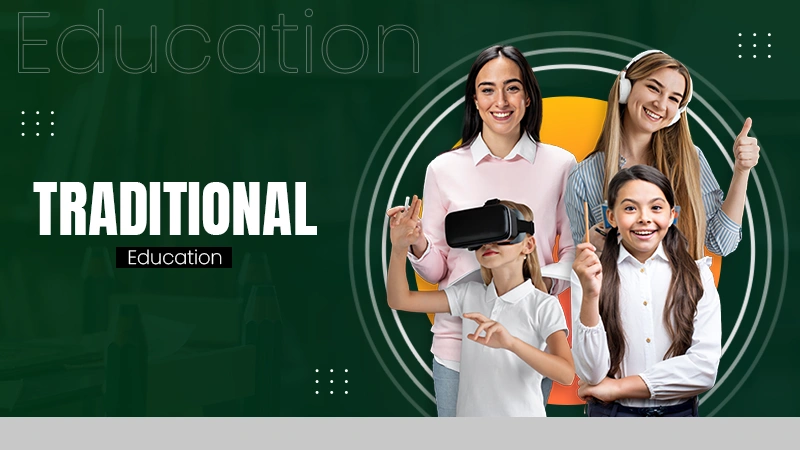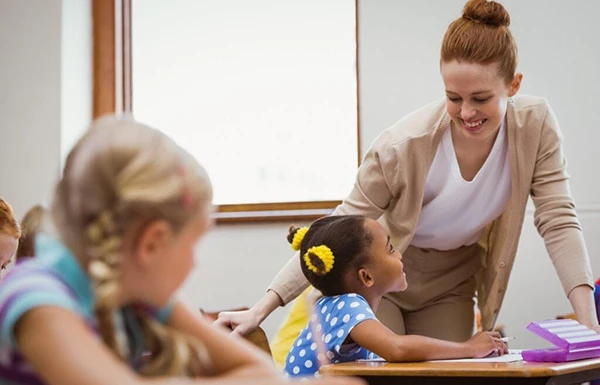
For generations, traditional education has been the primary form of learning, in classrooms led by teachers, with students learning on a schedule. Traditional education emphasizes the development of reading, writing, math, and problem-solving skills.
While there are more contemporary offerings (including online learning), traditional education continues to provide a structure and level of support needed for many learners to flourish.

Within traditional learning, teachers guide students in their learning through a curriculum. Teachers present ideas, ask questions, check for understanding, and guide students along the way.
This mixture of teaching and practice builds a solid foundation for success in school and life.
Are you interesting in learning more? Whether you are a parent or a student, you must take a look into this comprehensive article to make a strong foundation for the future.
KEY TAKEAWAYS
- Provides order, responsibility, and time management skills.
- Encourages interaction to build social and emotional skills.
- Emphasizes values, responsibility, and community contribution.
- Teachers serve as vital guides, instructors, and role models.
The Importance of Structure and Routine
A big advantage of traditional education is the sense of order it brings. Children have established schedules, assignments, and tests that keep them engaged in their learning. In addition, structure allows students to develop:
- responsibility
- self-discipline
- time management
These are critical not just for success in school, but also for accomplishments later in life. Having a routine also gives students stability. When they know what to expect, they can plan their time and reduce stress.
Over time, students see that focus creates forward motion, which is a lesson that benefits anyone at any given time in life. Check out Legacy Traditional School Deer Valley to learn more.
Learning and Growing Together
Traditional education also gives students plenty of chances to interact with others. In classrooms, they talk with teachers and classmates, ask questions, and share ideas. In a classroom setting, a student regularly interacts with a teacher and classmates, asks questions, and discusses various ideas.
Interacting socially in the classroom maximizes a student’s ability to learn critical social and emotional skills, including:
- speak clearly
- solve problems together
- support one another
These experiences teach important social and emotional skills that go far beyond academics.
Building Character and Values
Traditional education not only emphasizes the content, but also the character associated with that content; schools are not just there to educate academically, but to guide students toward respectful, responsible, caring lives. Teachers often serve as role models, showing students how to behave with kindness and honesty.
Extracurricular activities, such as sports, music, art, or service learning, teach students the value of teamwork and leadership. These experiences help students find their passions and learn how to contribute positively to their communities.
Teachers as Guides and Mentors
In traditional education, teachers are more than just instructors-they are mentors. Their job is to motivate them to be successful, celebrate their successes, and help them navigate through life’s difficulties. Building that community and connection with their students is important, letting the student know they are important and visible.
A caring teacher can make a big difference in a student’s life. When teachers believe in their students’ potential, it often inspires those students to work harder and dream bigger.
Combining Tradition with Modern Learning
Although traditional education is pedagogically sound, at times it can feel structured and antiquated to modern students. That’s why many schools now mix traditional methods with modern tools. Technology, interactive lessons, and creative projects make learning more engaging and personal.
The best part of a mix of traditional and modern methods, is that students can benefit from working within the structure of a traditional educational environment while recognizing and benefiting from a mix of engaging practices.
A Strong Foundation for the Future
Traditional education remains a trusted way to prepare students for success. It teaches discipline, respect, and teamwork skills that never go out of style. The principles of traditional education will always be important, despite the ongoing changes in education.
By combining structure, guidance, and personal growth, traditional education continues to build strong Traditional education continues to lay solid foundations that support students’ success in school, the workplace, and life by fusing structure, direction, and personal development.
If you want to read more articles, visit our blog.
Ans: The core benefit of traditional education is that it instills discipline, structure, and routine.
Ans: It facilitates regular social learning with teachers and classmates.
Ans: The teachers work as both instructors and caring mentors in a student’s life.
Ans: No, many schools successfully blend traditional education with modern learning tools.